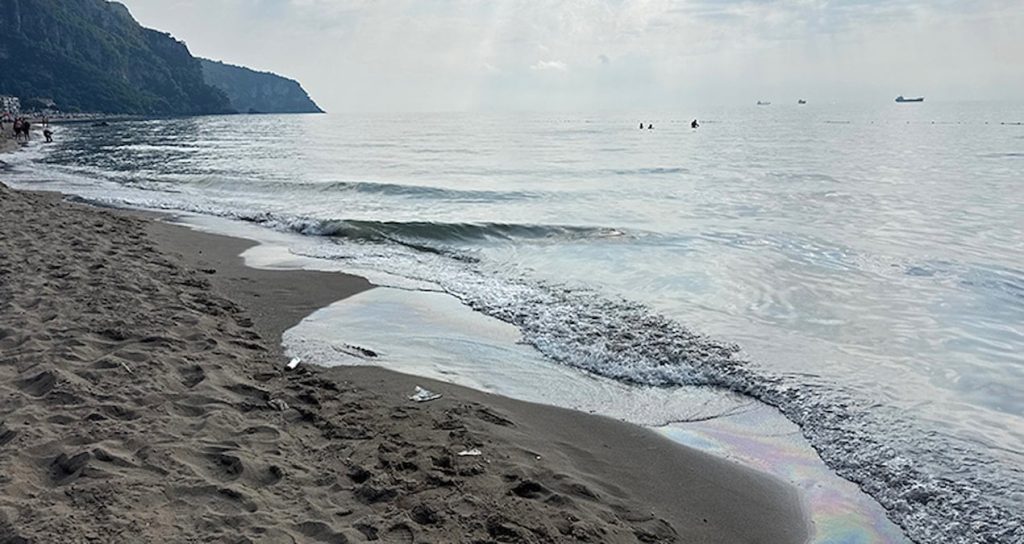Recent reports indicate that pollution has significantly impacted the Blue Flag beach located in Inkumu, Bartın. Notable for its pristine coastline, this popular vacation spot is currently facing a swimming ban due to a pervasive diesel smell and visible contaminants in the water. Local authorities, including the Bartın Coast Guard Command and environmental officials, are actively investigating the sources of the pollution to protect public health and restore the area’s natural beauty.
| Article Subheadings |
|---|
| 1) Authorities Respond to Pollution Crisis |
| 2) Health Risks Prompt Swimming Ban |
| 3) Public Reaction and Concerns |
| 4) Investigation into Sources of Pollution |
| 5) The Future of Inkumu Beach |
Authorities Respond to Pollution Crisis
The pollution at Inkumu beach has captured the attention of multiple authorities, who have joined forces to assess the situation. The Bartın Coast Guard Command, among other agencies, has been actively involved in examining the coastline and conducting tests on the seawater. These assessments are crucial in identifying the nature and extent of the pollution affecting the Blue Flag beach, a symbol of cleanliness and safety for holidaymakers.
On the ground, teams initiated immediate actions by collecting water and soil samples for analysis. The aim is to ascertain how these contaminants arrived on the beach and to implement swift remediation measures. Officials have also established communication lines with the Bartın Port, where they are investigating possible connections to cargo ships operating nearby.
Health Risks Prompt Swimming Ban
As a precautionary measure to safeguard public health, local officials announced that swimming would be prohibited along the contaminated shoreline. The provincial General Hygiene Board convened to deliberate on the issue, emphasizing the potential health hazards posed by swimming in polluted waters.
Governor of Bartın, Nurtaç Arslan, has expressed concern over the pollution, stating that immediate action is essential to protect beachgoers. The announcement was made following comprehensive discussions about how to maintain safety standards in articularly vulnerable environments such as Inkumu.
Public Reaction and Concerns
Local residents and vacationers are understandably alarmed by the recent developments. Many have expressed their concerns regarding the potential health effects of the polluted waters. Nazmi Özbey, a tourist from Ankara, voiced his worries about the pollution, remarking that the odor and visible contaminants deterred his family from entering the sea. He stated, “There’s a layer on the water surface, and the heavy smell is dominant on the beach,” highlighting the alarming nature of the situation.
Other locals, such as Bedirhan Erdogan, who resides in the holiday town, remarked that the smell and pollution not only affect tourism but also pose real threats to environmental and public health. Such sentiments underline the community’s call for swift action from authorities to tackle the problem effectively.
Investigation into Sources of Pollution
The ongoing investigation by authorities seeks to pinpoint the sources of pollution currently affecting Inkumu beach. Teams are scrutinizing cargo ships that have been anchored approximately five kilometers offshore, suspecting that they may be leaking pollutants into the ocean. One lead indicates that the presence of petroleum products could be contributing to the foul smell and visible signs of contamination.
Coastal security teams are determined to trace the pollution to its source while ensuring that diverse environmental agencies collaborate effectively. This multi-agency approach is vital for implementing comprehensive solutions aimed at both short-term containment and long-term safeguarding of the beach’s natural ecosystem.
The Future of Inkumu Beach
As the investigation unfolds, the future of Inkumu beach largely depends on the collective efforts of local authorities, environmental agencies, and community stakeholders. The community is hopeful for a swift resolution that not only addresses the current pollution but also implements measures to prevent future occurrences.
Continued monitoring and enforcement of environmental regulations will be crucial to restoring the beach’s status as a safe and welcoming destination. Local officials emphasize their commitment to taking any necessary actions to protect public health while working toward restoring the Blue Flag designation that signifies excellence in environmental and safety standards.
| No. | Key Points |
|---|---|
| 1 | Inkumu beach, a Blue Flag location, is facing pollution issues due to diesel odor and visible contaminants. |
| 2 | A swimming ban is imposed as a public health precaution by local authorities. |
| 3 | Tourists and locals are expressing concerns about health risks associated with swimming in polluted waters. |
| 4 | Authorities are investigating potential sources of pollution, including cargo ships offshore. |
| 5 | Efforts are being coordinated among various agencies to restore the beach’s environmental standards. |
Summary
The ongoing pollution crisis at Inkumu beach warrants immediate attention from authorities and the community. The collaboration among multiple agencies is crucial not only for addressing the current situation but also for preventing future environmental incidents. As officials work diligently to discover the sources and safeguard public health, the hope remains that this beloved coastal town can reclaim its status as a safe and vibrant destination for both locals and tourists.
Frequently Asked Questions
Question: What led to the swimming ban at Inkumu beach?
The swimming ban was implemented due to notable pollution, including a diesel smell and visible contaminants in the water, which posed health risks to beachgoers.
Question: Who is responsible for investigating the pollution?
Multiple authorities, including the Bartın Coast Guard Command and the provincial General Hygiene Board, are involved in the investigation to determine the sources of pollution.
Question: What actions are being taken to resolve the pollution issue?
Authorities are collecting water samples, scrutinizing nearby cargo ships, and conducting comprehensive assessments while coordinating efforts to restore the beach’s environmental quality.


